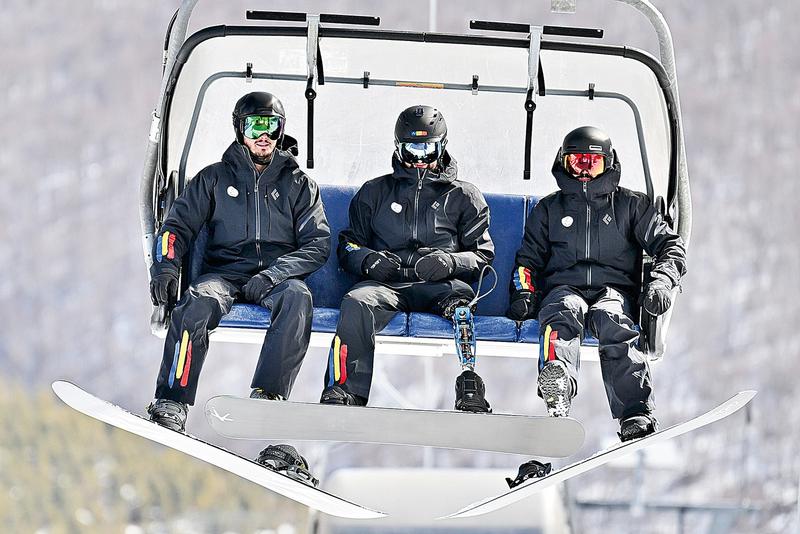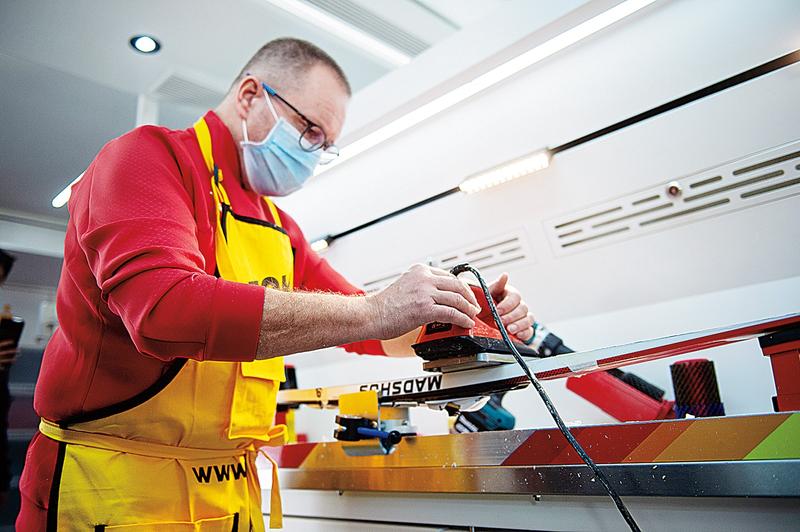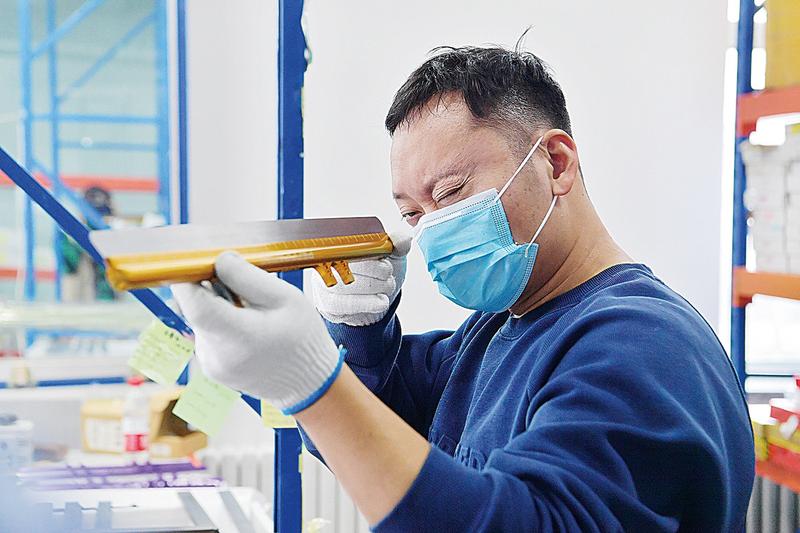Editor's Note: In a series of reports titled "Legacies of the Games", China Daily explores changes brought to the country by the Beijing 2022 Winter Olympics. This is the fourth part of the series.
 Ropeways operate at the Genting Resort Secret Garden in Zhangjiakou, Hebei province, during the Beijing Winter Olympics. (WEI XIAOHAO / CHINA DAILY)
Ropeways operate at the Genting Resort Secret Garden in Zhangjiakou, Hebei province, during the Beijing Winter Olympics. (WEI XIAOHAO / CHINA DAILY)
A company that has made ice and snow sports equipment for 71 years-one of the first of its kind in China-saw record revenue growth last month and in January.
The number of orders received by Heilong International Ice and Snow Equipment Co, headquartered in Qiqihar, Heilongjiang province, rose by 60 per cent compared with the same time last year.
The industry will only become more developed with active and in-depth public participation in winter sports.
Li Yanqiu, head of the China subsidiary of Doppelmayr/Garaventa Group
Ju Peihong, the company's CEO, said new orders for skates and snowboards continued to arrive from sports bureaus, schools and other institutions, in stark contrast to the start of previous years, when sales have often been poor.
"The success of the Beijing Winter Olympics has inspired the passion for ice and snow sports among Chinese people," he said. "This will boost public participation in such sports in the future."
Ju said the company expects to see sales growth this year of at least 35 percent. Last year, its revenue grew by 50 million yuan ($7.8 million), a 25 percent year-on-year rise.
 Romanian athletes use a ropeway at the Genting Resort Secret Garden while taking part in the Paralympic Games this month. (WEI XIAOHAO / CHINA DAILY)
Romanian athletes use a ropeway at the Genting Resort Secret Garden while taking part in the Paralympic Games this month. (WEI XIAOHAO / CHINA DAILY)
The development of high-end products is top of the company's agenda. Since last year, the privately owned sports equipment producer, in collaboration with educational institutions including Beijing Science and Technology University and Beijing Sport University, has invested more than 10 million yuan on blades made from high-tech materials.
This collaboration, funded partly by the government, involves working on challenges such as making lightweight steel for blades resistant to friction.
The company, which exports to four countries, plans to sell its mid-market and high-end products to more overseas destinations.
It is just one example of the domestic winter sports equipment manufacturers to benefit from the Games in Beijing.
Wu Bin, an expert in the winter sports industry and CEO of Beijing Xuebang Xueye Management Co, said the skiing industry will continue to witness strong growth in the wake of the Winter Olympics, propelled by favorable policies. The younger generation and a more prosperous industry will result in 57 million skier visits in China in 2030, compared with 20.76 million in 2020.
After some two decades of development, the domestic skiing industry-comprising resorts, equipment manufacturers, venue and facility providers, and property developers-is in an early stage of development, Wu said. Imports have provided much of the related clothing and equipment.
 A worker at the Beijing Winter Olympics polishes a snowboard in a waxing vehicle made in China. (CHEN ZHONGHAO / XINHUA)
A worker at the Beijing Winter Olympics polishes a snowboard in a waxing vehicle made in China. (CHEN ZHONGHAO / XINHUA)
Breakthroughs made
In recent years, with the help of government stimulus policies aimed at developing winter sports manufacturing-along with collaboration between companies and universities-breakthroughs have been made by snowmaking facilities, skiing gear manufacturers and resorts. Such progress has helped domestic brands.
According to the China Ski Industry White Paper, which was written and compiled by Wu, from 2014 to 2020, the number of ski resorts rose sharply, with 715 venues in operation in 2020.
Over 25 ski tourism venues were visited more than 150,000 person times in 2020, compared to only 16 in 2019. However, according to the report, aerial ropeways are only installed at just over 22 percent of the ski resorts in China, showing that the majority of facilities at domestic ski venues are still not advanced.
The number of snow grooming machines-which flatten snow for smooth skiing-is still far lower than the figure for domestic resorts, highlighting the strong potential to improve the level of services. However, the number of conveyor carpets, which are used by skiing novices, rose from 454 in 2014 to 1,466 in 2020.
Hu Wei, CEO of Nanshan Ski Resort, an established skiing venue in Beijing, said it is equipped with one aerial ropeway, a T-bar lift, two snowmaking machines and one grooming machine. All this equipment is imported.
In China, although domestic manufacturers produce winter sports clothing, equipment and machines, ski resorts of all sizes tend to prefer international brands for quality and safety to ensure that they run smoothly during the relatively short snow season.
Hu said domestic companies still find it difficult to operate and develop snow grooming machines for half-pipe slopes, adding that Nanshan Ski Resort hires international professionals to supervise maintenance of these machines.
The resort has received more than 500,000 visitors this year. Its visitor numbers and revenue both rose by 30 percent year-on-year during the winter season, which in Beijing runs from November to March.
Meanwhile, the Doppelmayr/Garaventa Group, a global leader in ropeway engineering headquartered in Austria, also benefited from the Winter Olympics in Beijing.
Li Yanqiu, head of the company's China subsidiary, said the prospects for the domestic winter sports gear industry are closely linked to the number of participants.
"The winter sports market has been in hot demand lately thanks to the Games and government support policies. We hope to keep this strong momentum going for the next five years," Li said.
"The industry will only become more developed with active and in-depth public participation in winter sports."
The Doppelmayr/Garaventa Group, which generated sales revenue of 763 million euros ($835 million) in the 2020-21 financial year, has provided more than 15,100 ropeways for customers in 96 markets.
Entering the Chinese market in 1995, it has installed some 140 ropeways in the country, including part of the infrastructure for the Beijing Winter Olympics, which were held from Feb 4 to 20.
 Former speedskater Wang Yang makes blades for ice skating at his factory in Changchun, Jilin province. (ZHANG YAO / CHINA NEWS SERVICE)
Former speedskater Wang Yang makes blades for ice skating at his factory in Changchun, Jilin province. (ZHANG YAO / CHINA NEWS SERVICE)
The company provided a total of 14 ropeways for Games venues in Yanqing district, Beijing, and in Zhangjiakou, Hebei province-nine for the Alpine Center in Yanqing and five for the Genting Resort Secret Garden in Zhangjiakou.
These ropeways were an important means of transportation for the Olympics, carrying athletes and their support teams to the slopes.
Li said growth of the skiing industry depends on beginners being trained from primary school level, adding that high costs and inconvenience in traveling to resorts have prevented winter sports becoming a mainstream activity.
"Skiing is still considered an expensive sports and tourism option for many Chinese people," Li said.
Many domestic ski resorts, mostly built from scratch and located far from top-tier cities, require investment of more than 1 billion yuan, resulting in additional costs for skiers and other visitors, he added.
Ding Shizhong, CEO and board chairman of Anta Sports, which is listed in Hong Kong, pointed to the uncertainties in keeping the winter sports industry healthy and on a sustainable development path after the Games.
He called for more efforts from the government to implement effective plans to support ice and snow activities, particularly at schools, communities and sports venues.
Ding said it is equally important to emphasize the integration of global winter sports resources with the Chinese market and the transfer of international technological know-how.
He suggested enhancing exchanges with leading snow and ice research and development centers worldwide, formulating plans for key technology research and upgrades to boost manufacturing capacity, and encouraging and supporting collaboration between winter sports gear manufacturers and venue operators.
Ding said establishing industrywide collaboration for the winter sports gear sector and lowering costs for small- and medium-sized enterprises by providing more financial support and improved services would help establish domestic brands.
Insiders said that for most small and medium-sized domestic enterprises in the winter sports industry, overcoming technological hurdles is tough and requires massive investment for long-term returns.
Wen Xiaoxuan, director of the new product center at Xuangong Mechanic Co in Hebei province, said a snow grooming machine was developed at the center last year after four years of research, but large-scale production is challenging, as it is limited by funding and market demands.
The company has developed seven ski grooming machines for medium-sized and large resorts.
However, despite costing 30 percent to 50 percent less than machines produced by its international competitors, and the company offering additional maintenance work, it is hard to sell to ski resorts demanding top-quality machines to guarantee that operations continue in extreme weather conditions, Wen said.
"The skiing season in China only lasts three to four months, so a resort needs something it can rely on to reduce the chance of malfunctions," Wen added.
Wen added that the company wants to attract more investors to diversify its product lines and to manufacture more snow grooming machines, including electronic ones.
 A worker smooths a ski track at Genting Resort Secret Garden. (WEI XIAOHAO / CHINA DAILY)
A worker smooths a ski track at Genting Resort Secret Garden. (WEI XIAOHAO / CHINA DAILY)
Sales double
Gaining recognition from local consumers in the winter sports gear industry can also be challenging.
Vision Industrial Co, based in Xiamen, Fujian province, has produced snowboards and other winter sports equipment for top global brands for 12 years, making 70,000 to 80,000 boards each year, with an annual production value of more than 30 million yuan.
Hu Zhihua, the company's general manager, said this year's Winter Olympics released consumption power and interest from international and domestic customers, adding that Vision Industrial Co's sales have doubled since Spring Festival.
"Eight out of 10 top snowboards are manufactured in China, but we are not ready to develop our own brand," Hu said.
Research and design are still not strong points for many Chinese ice and snow equipment manufacturers competing globally, despite the rise of local winter sports brands such as Nobaday and Goski.
Hu said that to cultivate domestic winter sports brands, it is vital to connect manufacturers with snow sports athletes to develop equipment enabling the latter to perform to their best.
He cited an old northern term, mao dong, which means that Chinese people like to hide at home in the winter.
Hu said: "The Beijing Winter Olympics have fundamentally altered such perceptions and have encouraged more people to venture outdoors and have fun with snow and ice sports. This is the beginning of everything for our industry."
wangzhuoqiong@chinadaily.com.cn


